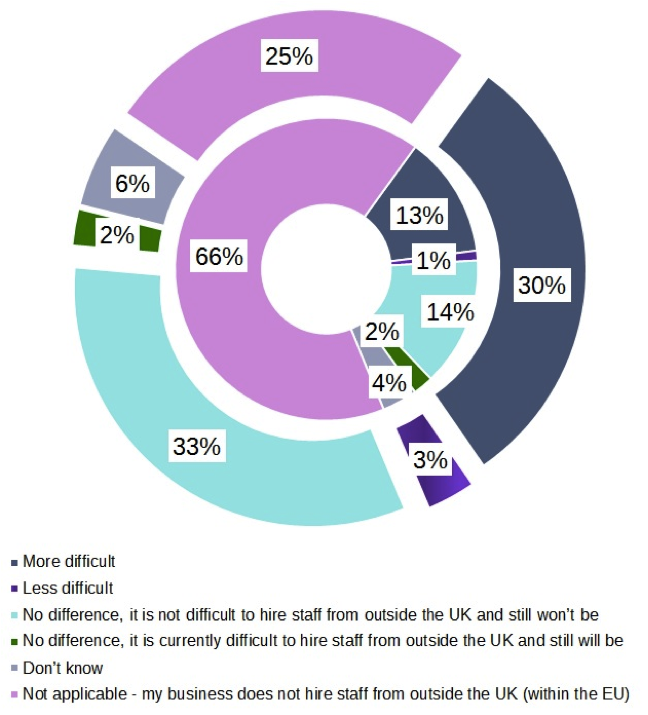Over the past six months we have seen a number of groups officially launch their campaigns either for or against Britain leaving the European Union. However, in what some may deem a rather unusual turn of events, the UK’s mass media has been largely (although admittedly not entirely) unbiased when it comes to reporting the opinions of both sides.
This may be one of the reasons why a recent YouGov survey commissioned by QuoteSearcher has revealed that, in general, the opinions of decision makers in small and medium-sized enterprises (SMEs) are currently split on whether an EU-exit would have a positive or negative effect on their businesses. Whether Britain chooses to remain within the EU is a complex issue, one that seems to either confuse or isolate those that could be affected the most.
Indeed, the survey of 683 SME decision makers (those that have the ability to make business decisions within the company including powers over hiring and resourcing) revealed that 66 percent of all small enterprise decision makers believe their ability to hire would not be affected by an EU exit – because they do not hire staff from outside the UK. Medium sizes enterprises, on the other hand, are warier of an EU-Exit, with only 25 percent believing it would not become harder to get the skills they need.
Figure 1: SMEs perception of the difficulty of hiring skilled workers after a possible exit from the EU
“There is actually a huge difference between a small and medium-sized business, the latter quite often being much more substantial, formalised and professional than their counterparts,” says Professor Simon Down, Deputy Dean for Research and Enterprise at The Lord Ashcroft International Business School, Anglia Ruskin University. “This is the issue with “lumping” the two together, as an “SME” can range anywhere between 10 and 250 employees, which means there is a large difference between the two.
“In medium sized enterprises, there is a much greater need for skills in a range of different sectors and technologies. Furthermore, these companies will have at least one tier of managerial staff who will have one to two specialisms, meaning the skills that they are looking for are likely to be much more sophisticated.
“Smaller businesses not hiring from outside the UK could come from a lack of resources or skills which are required to hire specialist workers from different nations. Meanwhile, medium sized businesses are generally more formal and can have dedicated HR departments who will hire a person with the required skills regardless of where they are from. If they need people they’ll get them from wherever and deal with the costs and administrative procedures. This is particularly true for those that work in high-tech companies, biotech firms etc. as the skills they need to grow are not always in high supply in Britain.”
Political Leanings vs. Business Acumen
Age is also likely to be a factor in the opinions regarding a possible exit from the European Union. Results show that a third of entrepreneurs under the age of 35 believe an EU exit will have a negative effect on their customer relationships compared to just 13 percent of those over 55. But the role of mass media is still likely to alter political leanings in the public sphere throughout 2016.
Professor Down explained: “Currently, the government are backtracking on the EU exit, a move which is supported by the mainstream media and influential groups. Businesses by and large, including SMEs, will probably follow this shift in opinion against an EU exit.
“As more campaigning happens, the anti-EU narrative may become less popular and wavering SME owners will want to look established and traditional so will follow suit. Most SMEs don’t want to be seen as rash or taking too many risks, so will back established opinions.
“However, this all depends on broader economic and political issues that we are seeing right now including the Greek crisis, the instability of the Euro and the current migration debate. This is an interesting, multi-faceted issue, and evidence has shown that the perceptions of business owners are not necessarily the same as their business behaviours.”
♣♣♣
Notes:
- This post gives the views of its author, not the position of LSE Business Review or the London School of Economics.
- Featured image credit: Business as usual DncnH CC-BY-2.0
 Ben Moore is the General Manager of QuoteSearcher, where he has spent the past seven years working with household names including Swinton, Brightside and Towergate. Ben’s area of expertise includes SMEs. He merges traditional brokerage with modern technology to develop new industry standards.
Ben Moore is the General Manager of QuoteSearcher, where he has spent the past seven years working with household names including Swinton, Brightside and Towergate. Ben’s area of expertise includes SMEs. He merges traditional brokerage with modern technology to develop new industry standards.






